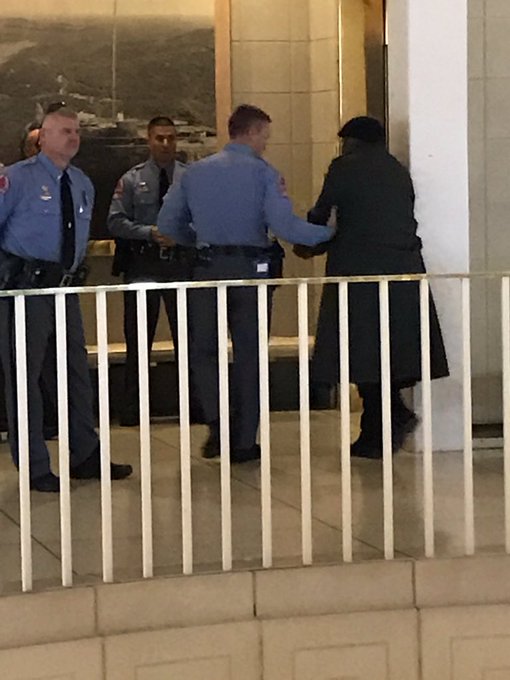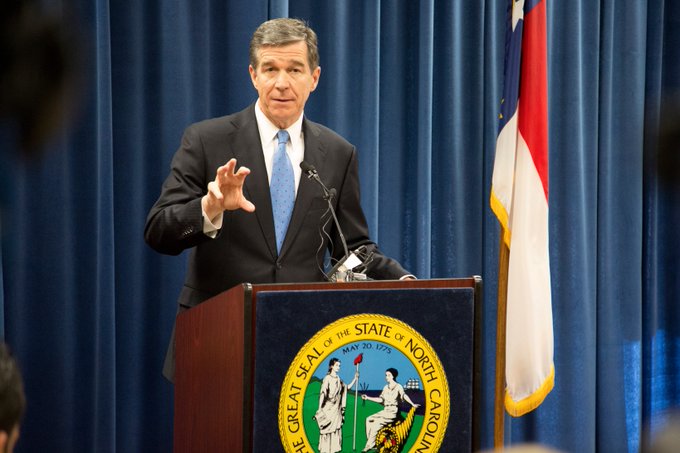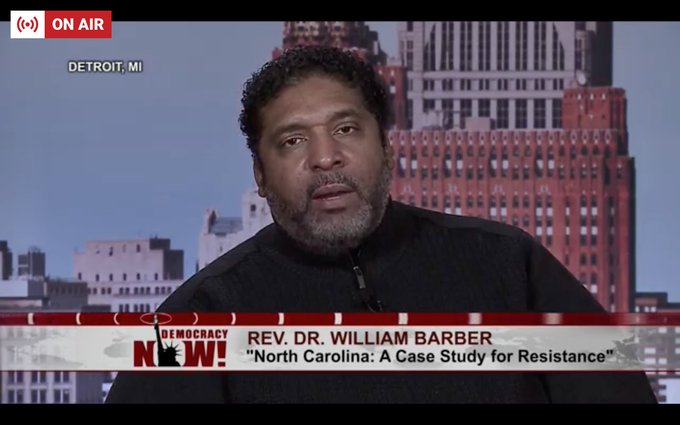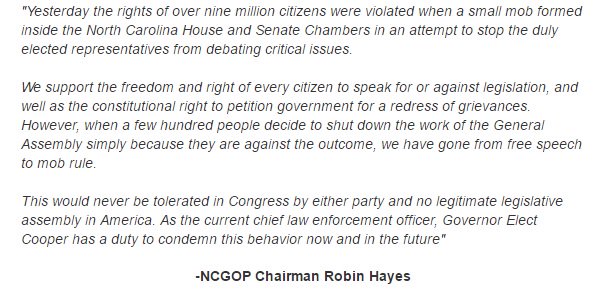Protests broke out in North Carolina over sudden, sweeping GOP measures to gut the power of the new Democratic governor, who prevailed in a tight and divisive contest over the Republican incumbent.
Despite the protest, the Republicans in control of the Legislature in the swing state moved anyway to “complete work on bills that would place checks upon Democrat Roy Cooper,” said CBS News. The NAACP led the protests on December 15 and 16 but has been protesting GOP efforts for years on such issues as voting rights and Medicaid, says WNCN-TV. The new Republican legislative moves are being rushed through just two weeks before Cooper takes office.
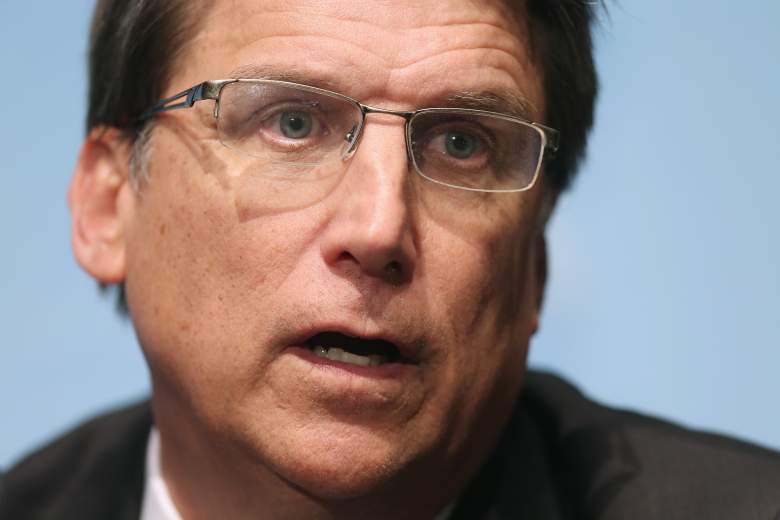
Pat McCrory.
Although Donald Trump won North Carolina, Cooper upset Republican incumbent Gov. Pat McCrory in an election that was exceptionally divisive, with McCrory and Republicans alleging unproven voter fraud. McCrory finally conceded the election. CNN called what the NCGOP has done since an “unprecedented power grab.”
McCrory had caused controversy with his support of a North Carolina “bathroom bill” regarding transgender people’s use of restrooms. Tensions in North Carolina have also risen after voting measures struck down by the courts, including a Voter ID that critics said was designed to suppress the votes of African-Americans. The current GOP moves have sparked a hashtag on Twitter (#NCGA): North Carolina General Assembly.
Here’s what you need to know:
1. The GOP Is Passing Measures to Restrict the Power of the New Democratic Governor
According to CBS News, the legislation would restrict “the team Cooper can bring into office, requires the Senate’s approval for top administrators at state agencies and erases the governor’s ability to shape elections boards statewide.”
Cooper has sharply criticized the measures, calling it all unprecedented, and saying the real motive is to “transfer taxpayer money to private schools, allow increased pollution of air and water, and cut taxes for big corporations instead of the middle class.”
According to CNN, the measures also would limit Cooper’s “ability to make Cabinet appointments, remove state and county election boards from Democratic control, slow legal battles’ path to the state Supreme Court — where a majority of justices were appointed by Democrats — and make the state Supreme Court elections partisan rather than non-partisan.”
CNN said another bill blocks “Cooper from appointing any members to the state Board of Education and to the board of trustees for the University of North Carolina system. It would reduce the number of appointments up to the Cooper administration from 1,500 to 300.”
2. Cooper Defeated McCrory in a Bitter Election by About 10,000 Votes
It took the Republican incumbent, McCrory almost a month to concede the election. According to The New York Times, McCrory and Republican allies lodged a series of challenges to the election results.
McCrory lost by just over 10,000 votes to Cooper, the state Attorney General. A Republican requested recount of partial vote totals in Durham did not show any major changes, said the Times.
NBC News said McCrory wanted a statewide recount, but Cooper’s lead surpassed 10,000 votes and the standard needed for a recount.
According to NBC, McCrory “filed complaints in about half of the state’s 100 counties but no evidence of widespread voter fraud ever came to light” and the governor’s GOP appointees on local county election boards rejected his complaints.
3. Two Former Governors Have Criticized the GOP Moves
Former North Carolina governors Jim Martin and Jim Hunt “criticized Republican lawmakers for trying to dilute the power of incoming Gov. Roy Cooper,” The Charlotte Observer said.
Martin is a Republican. He told the Charlotte Observer that the GOP measures go “too far.” The maneuvers came at a surprise special session held at the General Assembly.
Activists have also criticized the GOP, saying they are “extremists” who are trying to fight back against changing demographics.
McCrory, though, has signed the new bill.
Cooper does not take over as governor until January. According to ABC News, “Republicans gained power of both legislative chambers in 2010 for the first time in more than a century, and they have veto-proof majorities.” Cooper has threatened to sue.
4. Mass Arrests Were Made as NAACP Protests Spilled into the Statehouse
The Associated Press said 17 people were arrested in December 16 protests as the Legislature considered the measures.
WNCN said protesters shouted “All political power comes from the people!” and “our house,” among other things.
Rev. Kojo Nantambu of the North Carolina North Carolina NAACP was among those arrested.
There’s a long history. In summer 2016, the NAACP and voting rights activists won a victory when the courts struck down parts of a law that, according to The Chicago Tribune, “cut a week of early voting, eliminated out-of-precinct voting and required voters to show specific types of photo ID – restrictions” after it was determined that data showed the law “would disproportionately affect African Americans and other minorities.”
The Chicago Tribune reported that records showed “North Carolina GOP leaders launched a meticulous and coordinated effort to deter black voters, who overwhelmingly vote for Democrats.” In August, the U.S. Supreme Court refused to overturn a lower court’s move striking down the North Carolina Voter ID law and restrictions on early voting days.
The 4th U.S. Circuit Court of Appeals had struck down parts of the law in July arguing that Republicans used “intentional bias against black voters” when passing them in 2013. Republicans, including McCrory, appealed.
5. The NCGOP Called the Protesters a ‘Mob’
The North Carolina GOP said in a statement that protesters were a “mob” who violated the “rights of 9 million citizens.”
The Party said in a statement that the protesters had gone from “free speech to mob rule” by trying to shut down the work of the General Assembly because they disagreed with the outcome.
McCrory had fallen under criticism in part for supporting House Bill 2, which blocked transgender people from using the bathrooms of their choice in government buildings. The bill, called HB2, “sparked a national backlash, with numerous boycotts from businesses, musicians and sports organizations,” said NBC.
ABC News said Democrats “stripped the powers of the first and only GOP lieutenant governor of the 20th Century in the late 1980s.”
